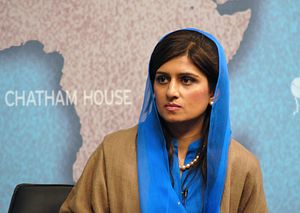Recently, senior PPP leader and former foreign minister Hina Rabbani Khar made some bold statements in an interview to Geo News, not only in the context of Pakistan’s approach toward India, but also on how Pakistan’s approach toward national identity has been flawed over the past seven decades.
Said Khar: “In 60 years, we have taught our children that our national identity is to hate someone, and we are doing it with those who are physically the nearest: Hostile with India and now hostile with Afghanistan.”
In the context of India’s ties with Pakistan, Khar remarked: “I believe that Pakistan cannot conquer Kashmir through war and if we cannot do that, the option we are left with is dialogue, and dialogue can only proceed with a partner with which we have normal relations and a certain level of mutual trust,”
These are both bold statements for a Pakistani leader. Current Prime Minister Nawaz Sharif, during a function organized by the South Asian Free Media Association in Lahore in 2011 to celebrate the independence days of India and Pakistan, was equally forthright. Sharif spoke not just about the common identity of both countries, but about how viewing the bilateral relationship through a security prism, with a zero sum approach, had been beneficial to neither country. Sharif, who has been speaking in favor of a better relationship between both countries for more than two decades, had to face the wrath of a number of hardliners arguing that he had sold out to India. Like his earlier tenures, Sharif again finds himself in an unenviable position vis-à-vis the army, where he is keen for better ties with India, but Rawalpindi is opposed to the same and has scuttled all his initiatives.
The interesting part about Khar’s recent speech as well as Sharif’s speech in 2011 is that they had the courage to question the current approach toward “patriotism” and national identity.
Here it would be important to point out that it is not just the mullahs and military responsible for the current mess in Pakistan. There is also a section among the so called “elite” in Pakistan who pose to be moderate and liberal, but blindly back the military, and are happy to apportion all the blame for Pakistan’s problems to external powers, without looking inwards. They can be found in the Foreign Service, think tank community, and the media. This section of Pakistanis is quick to blame India and the United States for all Pakistan’s problems, and also to accuse both of Islamophobia — but they conveniently forget the ill treatment of Uyghur Muslims in China’s Xinjiang province, where Ramadan fasting has been banned and minorities are ill treated. They also tend to ignore how over dependence on their all-weather friend China is harming the Pakistan economy, and how Pakistanis are likely to react to the increasing presence of Chinese in the China-Pakistan Economic Corridor projects. Their approach to foreign policy and security issues is dictated by what the army says or out of an insecurity vis-à-vis India.
Raza Habib Raja, in an article for the Huffington Post, “Are Pakistani Liberals Sellouts?” very rightly points out [all sic]:
I think one of the major problems is that in our collective psyche respect of army has become completely intertwined with patriotism. What people are completely forgetting that army is merely a part of state and it is NOT a holy cow. As an institution it should be held accountable just the way rest of the institutions are. Here you can literally abuse elected leaders but merely questioning army has assumed the status of a sin.
Raja’s words make sense when considering the thrust of an article written for Dawn by retired diplomat Munir Akram. Akram overlooks the Pakistan army’s shortcomings while accusing Pakistan’s politicians of selling out their country’s interests vis-à-vis India. Says Akram:
Since early days, India has attempted to co-opt Pakistani politicians, by fair means and foul. When out of office, some political leaders have had intimate contacts with the Indians. Shamefully, some of them — excluding the ruling party — are known to have expressed the desire for Indian and other foreign intervention in Pakistan’s internal affairs. Even today, the desire of some of Pakistan’s leaders to “normalize” relations with India at any cost is inexplicable.
In this atmosphere, Khar’s frank remarks need to be welcomed, though it will be a long time before the civil-military balance in Pakistan is likely to be restored. It is only when Pakistan genuinely looks within that its problems will be resolved, and ties with the outside world are likely to improve. The outside world too needs to realize that not all suave, English speaking, Western educated Pakistanis are liberal.
Tridivesh Singh Maini is a New Delhi based policy Analyst associated with the Jindal School of International Affairs, Sonipat, India.

































